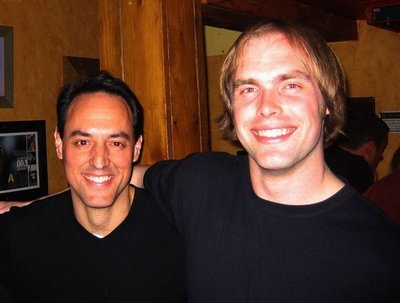August 17, 2006
Out of mentoring and research — a friendship grows
Nathan Kutz and Josh Proctor have worked, studied, traveled, published and even applied for a patent together in their roles as professor and student, boss and employee and principal investigator and student researcher.
But now, with Proctor having graduated from the UW, the two have settled into their most comfortable and continuing role of all — they’re just plain friends.
Kutz, 37, is a professor of applied mathematics. He met Proctor, now 23, when the student took his applied math 301 course, also called Introduction to Scientific Computing, back in 2004. Proctor seemed like an interested and talented student from the start.
“I have a pretty good history of mentoring undergraduates. I’ve had 15 over the last five or six years,” said Kutz, who has been at the UW for eight years. “And I recruit actively from my classes. I see how people do, and if I see somebody who is very gifted, I might approach them.”
Such was the case with Proctor, who said he took easily to applied math. “I was fairly adept at it. I had enjoyed computer programming and the math behind it; it’s very applied. I had only taken pretty much pure math, so it was cool having more applied problems, as in looking at real data sets from experiments.
“My experience started with wanting to do research while not really knowing what research was.” He had been working for the Aeronautics and Astronautics department, doing the decidedly unglamorous work of “sorting nuts and bolts,” but wanted to learn and do more. He said he was initially hesitant to work for Kutz because he was tired of the mundane work and wanted a challenge “to push my knowledge and skills.”
That’s exactly what Kutz offered. Proctor said the professor told him, “you have the skills to start doing real research, and we can push your skills to a higher level.”
Kutz got Proctor reading papers for him, and eventually moved him to his laser research project, which he said involves modulating the pulse of light from a laser through what is called “Q-switching.” They completed that work and wrote a paper together on the subject. Then, when Kutz was awarded a one-quarter sabbatical to work at the University of Sydney in Australia, he took Proctor and another research assistant, Braxton Osting, along for the trip.
Kutz moved his family — his wife and daughter (a second daughter has been born since) — to Australia with him for the quarter along with Proctor and Osting. “I think being in Australia was fantastic,” Kutz said. “It gave us a lot of time and there were no distractions … we were down there for that whole quarter, and it actually came along amazingly well.”
From this work, Kutz said, came yet another laser innovation built upon the earlier work — getting a modulated wave array to work as a laser source. They published another paper (one of four in all), and before long, colleagues suggested they apply for a patent, too.
Kutz and Proctor researched together in Australia, and often spent leisure time together, too. Kutz found a gym to work out at and, “since they didn’t have their own friends” down under, took Osting and Proctor along for his daily early-morning weight-lifting regime.
Over the years, Proctor and Kutz have grown to be buddies as well as colleagues. Of his friend and mentor, Proctor said, “He’s a guy — very down to Earth and different than many professors, I think, that want to keep that relationship very rigid.”
Braxton Osting graduated last year, and Proctor graduated this spring with a powerful but unusual double major in aeronautics and astronautics and English literature (“I grew up reading and writing a lot,” he explains).
As Proctor prepares to continue his studies at Princeton, this former professor and student have a mutual admiration society, a solid friendship, that likely will last the years.
“His creativity has been fantastic,” Proctor said of Kutz. “He’s always high-energy and looking for something creative.” The younger man said he also has learned much from the professor’s work ethic. “He’s one of the first guys into his department in the morning, and he realizes that when he’s there he’s working, getting as much stuff done and getting to as many people as he can.”
Kutz said that like any professor, he hears from a number of former students over the years. “But Josh is different — he’s more of a family friend. My daughter just loves Josh. He’s become integrated into our whole family.”
Kutz added, “I’m very happy he has graduated, so I’m not his boss anymore.”



